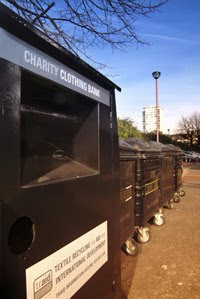"Re-ward Club gives you rewards when you have items repaired, hire a household item, shop in a charity shop, buy second-hand or buy recycled products. Anything, in fact, that gives a new lease of life to something you already own or that someone else has owned and loved."
 |
| Link to Re-ward Club web site |
Re-ward has been set up by the West London Waste Authority and is being run in partnership with the
London Borough of Brent and
London Borough of Richmond upon Thames. The initial set up costs have been funded through a Defra grant from the Waste Review 2011 Reward and Recognition Fund.
West London Waste Authority (WLWA)
West London Waste Authority (WLWA) is running the Re-ward Club to
incentivise increased spending by residents in local shops and charity
outlets that sell re-used items or repair items to extend their lifetime
and prevent them being thrown away. WLWA is a local authority similar
to your local council.
We provide a waste disposal service to your local council. The WLWA
is financed by charges made to the councils we serve. As a public body
the WLWA is not a profit making organisation. Any income that WLWA
receives is used to reduce the charges to the councils and ultimately
reduces the council tax bills of west London residents.
The WLWA is in the process of implementing an action plan to reduce
the amount of waste collected and disposed of. This plan includes a
number of actions targeting five specific materials – food, furniture,
electricals, textiles and nappies.
What Re-ward Club wants to achieve
Almost 700,000 tonnes of waste is thrown in the bin every year by
residents of Brent, Ealing, Harrow, Hillingdon, Hounslow and Richmond.
This includes many items could still be used by others. Re-ward Club is a loyalty card scheme, in many ways similar to those
run by supermarkets and coffee shops. It rewards residents who take
actions to reuse items or extend the lifespan of items they already own,
therefore reducing the need to purchase new items or dispose of
something which could still have a use.
Re-ward clubs want to do 4 things
- Make it easy to reuse and repair
There are a lot of local places where you can get items repaired or buy
second hand items but they’re not always easy to find. We want to shout
their locations from the rooftops to show just how many places there
are and help you find these locations – where you can save money and
pick up a bargain. If you know where they are it’s easier for you to use
them.
- Help you reuse and repair more frequently
It’s not always possible to get something repaired or buy it second hand
but you might be surprised by what’s out there! It doesn’t hurt to ask
and now you know where all these shops are there’s no limit on how
often you could use them.
- Show you how great second hand, repaired and recycled products really are
You might think you know what you’re going to find in a charity shop or
second hand stores but you might be pleasantly surprised at how good
quality some of the things you can buy really are. It doesn’t hurt to
look once and see what’s out there. Especially when you find the
Christmas decorations made from CD’s or belt from old fire hoses.
- Support local shops
Sometimes you don’t really think about the shop down the road when
you’re on your way to wherever you need to be but if they provide you
with a great service or product that can save you money and need your
needs why not give it a try. Tell us about them and we’ll try to
encourage them to sign up so you can get Re-ward Club tokens when you
shop there.



























